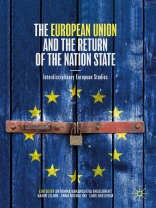This book explores the complex and ever-changing relationship between the European Union and its member states. The recent surge in tension in this relationship has been prompted by the actions of some member state governments as they question fundamental EU values and principles and refuse to implement common decisions seemingly on the basis of narrowly defined national interests. Furthermore, Brexit forces the EU for the first time to face the prospect of a major member state preparing to leave the Union. Are these developments heralding the return of the nation-state, and if so, in what form? Is the national revival a lasting phenomenon that will affect the EU for a long time to come, or is it a transitory trend? This book takes an interdisciplinary approach to answer these questions. It brings together scholars from economics, law, and political science to provide insights into the multifaceted relations between the Union and its member states from different perspectives. Allchapters are based on up-to-date research findings, succinct assessments of the current state of affairs and ongoing debates about the direction of European integration. The book concludes by offering policy recommendations at European and national levels.
สารบัญ
1. The EU, the nation state and the perennial challenge to European integration (Antonina Bakardjieva Engelbrekt, Karin Leijon, Anna Michalski and Lars Oxelheim).- 2. The EU Hybrid – Incrementalism with democracy? (Torbjörn Bergman and Magnus Blomgren).- 3. When the return of the nation-state undermines the rule of law: Poland, the EU, and Article 7 TEU (Andreas Moberg).- 4. The refugee crisis and the reinvigoration of the nation-state: Does the European Union have a common asylum policy? (Magnus Henrekson, Tino Sanandaji and Özge Öner).- 5. Brexit and the survival of the Union (Rikard Forslid and Sten Nyberg).- 6. EU tax law and the return of the Nation State (Cécile Brokelind).- 7. The euro and the nation state that never disappeared: Would Europe benefit from the return of national currencies? (Fredrik NG Andersson).- 8. Sanctions against individuals and the rule of law: Can the member states let the EU decide? (Jane Reichel).- 9. Europeanisation and the longevity of the nation-state: Survival by transformation? (Malin Stegemann Mc Callion).- 10. The dream of the nation state: is regional secessionism a threat to European integration? (Niklas Bremberg).
เกี่ยวกับผู้แต่ง
Antonina Bakardjieva Engelbrekt is Professor of European Law at the Faculty of Law at Stockholm University, Sweden, and Chair of the Swedish Network for European Legal Studies. She was Torsten and Ragnar Söderberg Professor of Legal Science (2015-2018). Her research is in the area of European economic law with an interest in processes of Europeanisation and globalisation and their influence on national law and institutions.
Karin Leijon is a researcher at the Department of Government, Uppsala University, Sweden. She is Coordinator for the Swedish Network for European Studies in Political Science (SNES). Her research focuses on judicial politics, European legal integration and public administration.
Anna Michalski is Associate Professor in Political Science at the Department of Government, Uppsala University, Sweden, Associate Senior Fellow at the Swedish Institute of International Affairs, and Visiting Scholar at Hong Kong University. She is Chair for the Swedish Network for European Studies in Political Science (SNES). Her research focuses on European foreign policy, EU-China relations, strategic partnerships and socialization in international organizations.
Lars Oxelheim is Professor of International Business and Finance at the University of Agder, Norway, and Professor Emeritus at Lund University, Sweden. He is affiliated with the Research Institute of Industrial Economics, Stockholm, Sweden, and Honorary Professor at Fudan University, Shanghai, China. His research focuses on the interplay between the firm and its macroeconomic environment encompassing economic and financial integration as well as managerial aspects, corporate governance and risk management.












